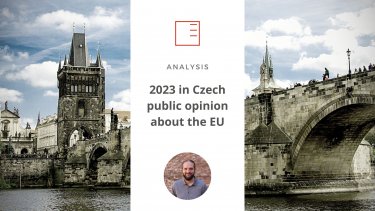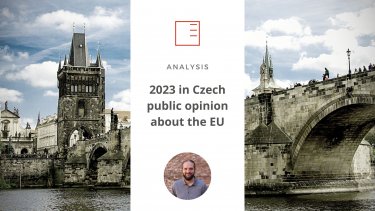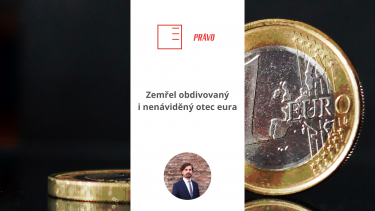ANALYSIS | 2023 in Czech public opinion about the EU
What were the trends in the views of the Czech population towards the European Union in 2023? Read the analysis by EUROPEUM Institute Senior Research Fellow Vít Havelka.
Show more
ANALÝZA | 2023 v českém veřejném mínění o EU
Jaké byly v roce 2023 trendy v názorech obyvatel ČR vůči Evropské unii? Přečtěte si v analýze, kterou vypracoval seniorní výzkumný pracovník Institutu EUROPEUM Vít Havelka.
Show more
Policy Paper | Will the future of the EU be driven top-down or bottom up?
Read the article by Markéta Pekarčíková, who has written a policy paper on possible approaches and proposals that the European Union could follow or at least be inspired by. It provides a theoretical perspective on the future of the European Union as perceived by the previous European Commission under the leadership of Jean-Claude Juncker. The EU27 was to decide its future by 2025.
Show morePolicy Paper | Bude budoucnost EU řízena shora dolů nebo zdola nahoru?
Přečtěte si článek Markéty Pekarčíkové, která napsala policy paper, který se zabývá možnými přístupy a návrhy, které by Evropská unie mohla následovat nebo se jimi alespoň inspirovat. Poskytuje teoretický pohled na budoucnost Evropské unie, jak ji vnímala předchozí Evropská komise pod vedením Jeana-Clauda Junckera. Evropská sedmadvacítka měla o své budoucnosti rozhodnout do roku 2025.
Show morePrávo | The admired and hated father of the euro has died
Jacques Delors, one of the fathers of the euro and a politician who influenced the future of the European Union, died on Wednesday 27 December 2023 at the age of 98. Read what Viktor Daněk, Deputy Director, wrote about him for Právo.
Show morePrávo | Zemřel obdivovaný i nenáviděný otec eura
Ve středu 27. prosince 2023 zemřel v 98 letech Jacques Delors, jeden z otců eura a politik, který ovlivnil budoucnost Evropské unie. Přečtěte si co o něm napsal Viktor Daněk, zástupce ředitele, pro Právo.
Show moreBLOG | Gender quotas in business: the European Union and its strategy for equality
Even in the most developed countries in the world of today, there is still inequality between men and women, especially in the top public positions. One way of tackling this problem is gender quotas, which the European Union has now taken up in a business context. You can read about the adopted directive and the EU's overall strategy to address the under-representation of women in our intern Natálie Hendlingerová's new blog.
Show moreBLOG | Genderové kvóty v byznysu: Evropská unie a její strategie pro rovnost
I v nejvyspělejších zemích dnešního světa stále panuje nerovnost mezi muži a ženami, a to zejména na nejvyšších veřejných funkcích. Jedním ze způsobů řešení tohoto problému jsou genderové kvóty, k nimž nyní v kontextu byznysu přistoupila i Evropská unie. O přijaté směrnici a celkové strategii EU pro rovnost se můžete dočíst v novém blogu naší stážistky Natálie Hendlingerové.
Show moreBLOG | European Certificate of Parenthood - will children have the same rights?
Up to two million children may currently have difficulties in having their parentage recognised within the EU. This is due to different laws in different Member States, which often severely restrict children's rights. The European Commission's proposal, supported by a vote in Parliament, aims to harmonise these different approaches and thus create a more child-friendly situation. Read more in our intern Veronika Vráblíková's new blog.
Show moreBLOG | Evropské osvědčení o rodičovství – budou mít děti stejná práva?
Až dva miliony dětí mohou mít v současné době v rámci EU potíže s uznáním jejich rodičovství. Důvodem jsou rozdílné zákony v jednotlivých členských státech, které často práva dětí zásadně omezují. Návrh Evropské komise podpořený hlasováním v Parlamentu má za cíl tyto odlišné přístupy sjednotit a vytvořit tak pro děti příznivější situaci. Více se dočtete v novém blogu naší stážistky Veroniky Vráblíkové.
Show moreStaroměstské náměstí 4/1
Prague 1 - Staré Město
110 00
tel.: +420 212 246 552
email: europeum@europeum.org
https://www.europeum.org







